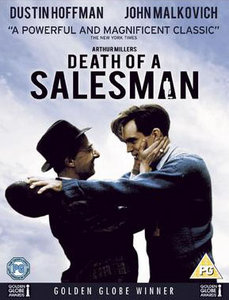Death of a Salesman (1985 film)
| Death of a Salesman | |
|---|---|

DVD cover
|
|
| Genre | Drama |
| Based on |
Death of a Salesman by Arthur Miller |
| Written by | Arthur Miller |
| Directed by | Volker Schlöndorff |
| Starring |
Dustin Hoffman Kate Reid John Malkovich Stephen Lang |
| Music by | Alex North |
| Country of origin | United States |
| Original language(s) | English |
| Production | |
| Producer(s) |
Robert F. Colesberry Michael Nozik (associate producer) Nellie Nugiel (associate producer) |
| Cinematography | Michael Ballhaus |
| Editor(s) | David Ray |
| Running time | 136 minutes |
| Production company(s) |
Roxbury Productions Punch Productions |
| Distributor | CBS |
| Release | |
| Original release | August 16, 1985 |
Death of a Salesman is a 1985 American made-for-television film adaptation of the 1949 play of the same name by Arthur Miller, directed by Volker Schlöndorff, starring Dustin Hoffman, Kate Reid, John Malkovich, Stephen Lang and Charles Durning. The film follows the script of the 1949 play almost exactly and originally premiered on CBS on August 16, 1985.
The film earned 10 Emmy nominations at the 38th Primetime Emmy Awards ceremony and 4 Golden Globe nominations at the 43rd Golden Globe Awards ceremony, winning 3 and 1, respectively.
Willy Loman (Dustin Hoffman) returns home exhausted after a canceled business trip. Worried over Willy's state of mind and recent car crash, his wife Linda (Kate Reid) suggests that he asks his boss Howard Wagner (Jon Polito) to allow him to work in his home city so he will not have to travel. Willy complains to Linda that their son Biff (John Malkovich), who is visiting, has yet to make good on his life. Despite Biff's promise as an athlete in high school, he flunked senior year math and never went to college.
Biff and his brother Happy (Stephen Lang), who is also visiting, reminisce about their childhood together. They discuss their father's mental degeneration, which they have witnessed by his constant vacillations and talking to himself (Willy is prone to having frequent flashbacks in which he sees events and figures from his past, such as his long-deceased older brother Ben (Louis Zorich), Willy's idol; unable to distinguish between his memories and present-day reality, he speaks to the people in his flashbacks as if they were real, startling those around him). When Willy walks in, angry that the two boys have never amounted to anything, Biff and Happy tell Willy that Biff plans to make a business proposition the next day in an effort to pacify their father.
...
Wikipedia
